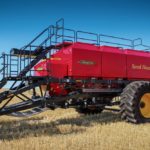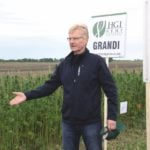
Tag Archives Tillage

Consider tillage rotation for improved soil management
High-speed, aggressive tillage can erode fields, especially in hilly terrain

Get your topsoil moving
Landscape restoration can offer immediate yield boosts

Soybeans raise tillage issues
As the low-residue crop creeps into new areas, new techniques are needed

Erosion lessons learned… and forgotten
The dust-covered snow of this winter suggests there’s a soil erosion problem brewing, MSSS speaker says
Opinion: Ongoing evolution necessary in farming

Tillage questions posed for Manitoba
David Lobb with the University of Manitoba is researching the cost of soil degradation

Manitoba sees changing erosion landscape
Manitoba may not have a lot of topography but Dr. David Lobb says it’s enough for tillage erosion, especially as soybeans expand

Seed Hawk to take parent firm’s name

Measuring tillage impact
There may be a middle path that gives the best results

Can organic no till work in the field?
Environmental benefit is part of organic market value, but organic weed management usually means tillage, commonly considered a black mark for soil health. Is there a middle ground?




